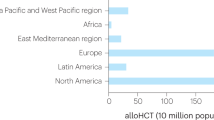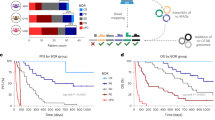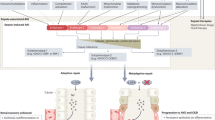Abstract
Intestinal dysbiosis has been associated with acute gastrointestinal GvHD and poor outcome following allogeneic stem cell transplantation (ASCT). To assess the effect of a switch in 2012 from ciprofloxacin/metronidazole to rifaximin for gut decontamination on intestinal microbiota composition and ASCT outcome, we retrospectively analyzed 394 patients receiving ASCT from September 2008 through June 2015. In 131 and 90 patients, respectively, urinary 3-indoxyl sulfate levels and intestinal enterococcal load were measured before conditioning and weekly within the first 28 days after ASCT. The use of rifaximin correlated with lower enterococcal positivity (6.9 vs 21.9%, P=0.05) and higher urinary 3-indoxyl sulfate concentrations (10.5 vs 4.6 μmoL/mmoL crea, P<0.001) after ASCT. Patients on rifaximin showed lower 1-year transplant-related mortality (P=0.04) and higher overall survival (P=0.008). Treatment of infectious complications with systemic antibiotics did not abrogate the beneficial effects of rifaximin on intestinal microbiota composition in the early course of ASCT and outcome. The data underscore the importance of maintaining a diverse population of symbiotic and mutualistic bacteria in the gut on ASCT outcome.
This is a preview of subscription content, access via your institution
Access options
Subscribe to this journal
Receive 12 print issues and online access
$259.00 per year
only $21.58 per issue
Buy this article
- Purchase on Springer Link
- Instant access to full article PDF
Prices may be subject to local taxes which are calculated during checkout




Similar content being viewed by others
References
Ferrara JL, Levine JE, Reddy P, Holler E . Graft-versus-host disease. Lancet 2009; 373: 1550–1561.
van Bekkum DW, Roodenburg J, Heidt PJ, van der Waaij D . Mitigation of secondary disease of allogeneic mouse radiation chimeras by modification of the intestinal microflora. J Natl Cancer Inst 1974; 52: 401–404.
Blaser MJ . The microbiome revolution. J Clin Invest 2014; 124: 4162–4165.
Jenq RR, Ubeda C, Taur Y, Menezes CC, Khanin R, Dudakov JA et al. Regulation of intestinal inflammation by microbiota following allogeneic bone marrow transplantation. J Exp Med 2012; 209: 903–911.
Holler E, Butzhammer P, Schmid K, Hundsrucker C, Koestler J, Peter K et al. Metagenomic analysis of the stool microbiome in patients receiving allogeneic SCT: Loss of diversity is associated with use of systemic antibiotics and more pronounced in gastrointestinal GvHD. Biol Blood Marrow Transplant 2014; 20: 640–645.
Taur Y, Jenq RR, Perales MA, Littmann ER, Morjaria S, Ling L et al. The effects of intestinal tract bacterial diversity on mortality following allogeneic hematopoietic stem cell transplantation. Blood 2014; 124: 1174–1182.
Weber D, Oefner PJ, Hiergeist A, Koestler J, Gessner A, Weber M et al. Low urinary indoxyl sulfate levels early after ASCT reflect a disrupted microbiome and are associated with poor outcome. Blood 2015; 126: 1723–1728.
Scarpignato C, Pelosini I . Rifaximin, a poorly absorbed antibiotic: pharmacology and clinical potential. Chemotherapy 2005; 51: 36–66.
Ojetti V, Lauritano EC, Barbaro F, Migneco A, Ainora ME, Fontana L et al. Rifaximin pharmacology and clinical implications. Expert Opin Drug Metab Toxicol 2009; 5: 675–682.
Koo HL, DuPont HL . Rifaximin: a unique gastrointestinal-selective antibiotic for enteric diseases. Curr Opin Gastroenterol 2010; 26: 17–25.
Maccaferri S, Vitali B, Klinder A, Kolida S, Ndagijimana M, Laghi L et al. Rifaximin modulates the colonic microbiota of patients with Crohn's disease: an in vitro approach using a continuous culture colonic model system. J Antimicrob Chemother 2010; 65: 2556–2565.
Beelen DW, Elmaagacli A, Muller KD, Hirche H, Schaefer UW . Influence of intestinal bacterial decontamination using metronidazole and ciprofloxacin or ciprofloxacin alone on the development of acute graft-versus-host disease after marrow transplantation in patients with hematologic malignancies: final results and long-term follow-up of an open-label prospective randomized trial. Blood 1999; 93: 3267–3275.
Kreutz M, Eissner G, Hahn J, Andreesen R, Drobnik W, Holler E . Variations in 1 alpha,25-dihydroxyvitamin D3 and 25-hydroxyvitamin D3 serum levels during allogeneic bone marrow transplantation. Bone Marrow transplantation 2004; 33: 871–873.
Hold GL, Smith M, Grange C, Watt ER, El-Omar EM, Mukhopadhya I . Role of the gut microbiota in inflammatory bowel disease pathogenesis: what have we learnt in the past 10 years? World J Gastroenterol 2014; 20: 1192–1210.
Kolho KL, Korpela K, Jaakkola T, Pichai MV, Zoetendal EG, Salonen A et al. Fecal microbiota in pediatric inflammatory bowel disease and its relation to inflammation. Am J Gastroenterol 2015; 110: 921–930.
Eriguchi Y, Takashima S, Oka H, Shimoji S, Nakamura K, Uryu H et al. Graft-versus-host disease disrupts intestinal microbial ecology by inhibiting Paneth cell production of alpha-defensins. Blood 2012; 120: 223–231.
Hansen JJ . Immune responses to intestinal microbes in inflammatory bowel diseases. Curr Allergy Asthma Rep 2015; 15: 61.
Gao J, Gillilland MG 3rd, Owyang C . Rifaximin, gut microbes and mucosal inflammation: unraveling a complex relationship. Gut Microbes 2014; 5: 571–575.
Prantera C, Lochs H, Campieri M, Scribano ML, Sturniolo GC, Castiglione F et al. Antibiotic treatment of Crohn's disease: results of a multicentre, double blind, randomized, placebo-controlled trial with rifaximin. Aliment Pharmacol Ther 2006; 23: 1117–1125.
Shafran I, Johnson LK . An open-label evaluation of rifaximin in the treatment of active Crohn's disease. Curr Med Res Opin 2005; 21: 1165–1169.
Jiang ZD, Ke S, Dupont HL . Rifaximin-induced alteration of virulence of diarrhoea-producing Escherichia coli and Shigella sonnei. Int J Antimicrob Agents 2010; 35: 278–281.
Brown EL, Xue Q, Jiang ZD, Xu Y, Dupont HL . Pretreatment of epithelial cells with rifaximin alters bacterial attachment and internalization profiles. Antimicrob Agents Chemother 2010; 54: 388–396.
DuPont HL . Therapeutic effects and mechanisms of action of rifaximin in gastrointestinal diseases. Mayo Clin Proc 2015; 90: 1116–1124.
Hirota SA . Understanding the molecular mechanisms of rifaximin in the treatment of gastrointestinal disorders—a focus on the modulation of host tissue function. Mini Rev Med Chem 2015; 16: 206–217.
Cheng J, Shah YM, Gonzalez FJ . Pregnane X receptor as a target for treatment of inflammatory bowel disorders. Trends Pharmacol Sci 2012; 33: 323–330.
Qayed M, Langston A, Chiang KY, August K, Hilinski JA, Cole CR et al. Rifaximin for preventing acute graft-versus-host disease: impact on plasma markers of inflammation and T-cell activation. J Pediatr Hematol Oncol 2013; 35: e149–e152.
Acknowledgements
This study was supported by the German Research Foundation (DFG, KFO ‘Elite’). We acknowledge the help of Heike Bremm, Constanze Winter and Yvonne Schumann in collecting and cryopreserving patient specimens as well as Nadine Nuernberger in performing 3-IS analyses. This work was partially supported by grants from the Regensburg Center for Interventional Immunology and the Marie Curie Initial Training Network Celleurope, European Commission. The project upon which this publication is based was partially supported by grants from the University of Regensburg, Medical Center (ReForM). DW received support from the German Jose Carreras Foundation.
Author contributions
DW, EH and WH were involved in conception and design of the study. DW and JH were responsible for collection of specimens. PO and KD performed measurements of 3-IS levels. AH, JK and AG conducted enterococcal analysis. MW contributed to statistic data analysis. DW and EH collected and analyzed clinical data and wrote the manuscript. All authors read and corrected the final draft.
Author information
Authors and Affiliations
Corresponding author
Ethics declarations
Competing interests
The authors declare no conflict of interest.
Additional information
Supplementary Information accompanies this paper on Bone Marrow Transplantation website
Supplementary information
Rights and permissions
About this article
Cite this article
Weber, D., Oefner, P., Dettmer, K. et al. Rifaximin preserves intestinal microbiota balance in patients undergoing allogeneic stem cell transplantation. Bone Marrow Transplant 51, 1087–1092 (2016). https://doi.org/10.1038/bmt.2016.66
Received:
Revised:
Accepted:
Published:
Issue Date:
DOI: https://doi.org/10.1038/bmt.2016.66
This article is cited by
-
Challenges and opportunities targeting mechanisms of epithelial injury and recovery in acute intestinal graft-versus-host disease
Mucosal Immunology (2022)
-
Host-microbe interactions and outcomes in multiple myeloma and hematopoietic stem cell transplantation
Cancer and Metastasis Reviews (2022)
-
Rifaximin use favoured micafungin-resistant Candida spp. infections in recipients of allogeneic hematopoietic cell transplantation
Annals of Hematology (2021)
-
Primary prophylaxis of bacterial infections and Pneumocystis jirovecii pneumonia in patients with hematologic malignancies and solid tumors: 2020 updated guidelines of the Infectious Diseases Working Party of the German Society of Hematology and Medical Oncology (AGIHO/DGHO)
Annals of Hematology (2021)
-
Microbiome: An Emerging New Frontier in Graft-Versus-Host Disease
Digestive Diseases and Sciences (2019)



